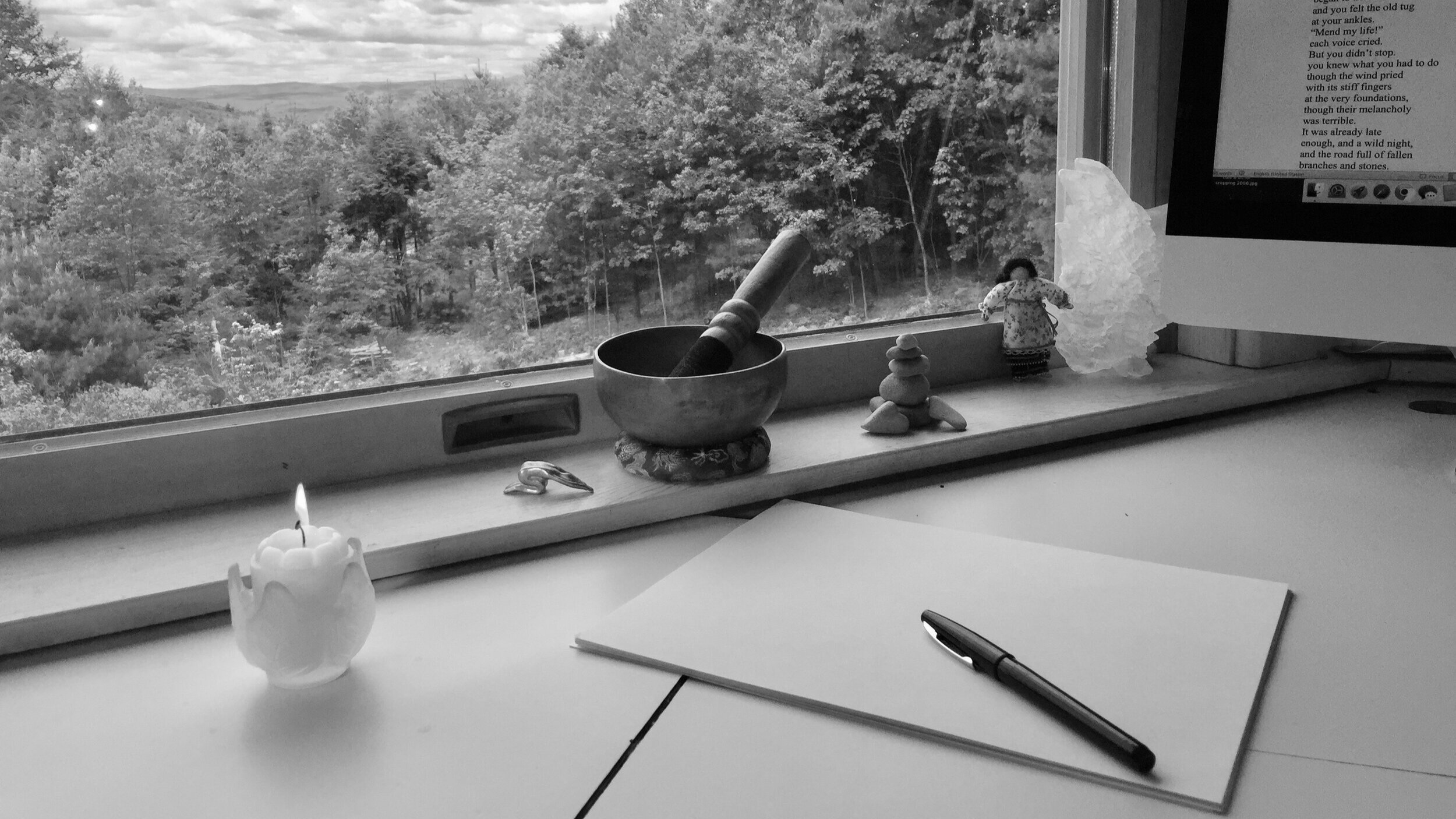Healing Feelings: Reconnecting Mind, Body and Voice
A workshop for survivors of incest and sexual abuse.
Watch this Trauma Therapist Project podcast; a lively interview of Anna and Donna with Guy Macpherson, Phd.
Writing is healing. Through writing our truth, we can heal our heart, mind, spirit – and even our body. Trauma can make us feel like our mind and body are separate from each other. Through writing, we can heal the split and reconnect into wholeness.
This workshop is for survivors who experience chronic pain and other syndromes*. In it, we will be using expressive writing as a means of safely exploring and releasing repressed and conflicting emotions that are often at the root of chronic syndromes – and inviting in the innate creativity that fuels our healing.
This workshop, designed and led by survivors of incest, joins together and builds upon two bodies of work:
Donna Jenson has been leading writers’ circles for survivors of sexual abuse and assault wanting to find their voice and use it since 2010. Her healing path is filled with writing experiences both alone and with others as far back as the mid 1970’s. She writes: “Buried under our traumas there runs a deep wellspring of creativity and joy waiting to be tapped into within a circle of survivors writing together.”
Anna Holtzman is a mind-body psychotherapist and writer who uses expressive journaling to help clients heal from chronic syndromes, as well as in her own journey of healing from migraines. Her mentors are followers of the late Dr. John Sarno, author of Healing Back Pain: The Mind-Body Connection. Through the mind-body approach, Anna has been able to take back her life from the grips of persistent pain.
Each workshop session will be comprised of two halves: In the first half, Anna will lead the group in a brief mind-body theory lesson followed by a guided journaling exercise. In the second half, Donna will lead the group in a creative writing session punctuated by inspirational readings and gentle breathing and mindfulness practices.
Participants are invited to read what they have written to the group and we honor each other’s voices by actively listening. This act of listening, to one’s own words as well as each other’s, confirms and affirms that what each narrator has to say is worthy of our undivided attention. Then positive feedback about what has stayed with us from each piece of writing is offered from the group. In this way each narrator is given the profound message that their voice has been received, heard and honored.
We follow a set of group guidelines that holds our space and spirits safely together.
If you are interested in participating in this workshop, let’s set up a time to talk to see if this is the right fit for you. We would each love to speak with you. Click here to make a phone appointment with Donna or here to make a phone appointment with Anna.
The workshop is limited to six (6) members running for six sessions, every other week, for two hours, done online through Zoom. Cost $275.00
Fall 2021 Workshop Dates
Please note, the Fall 2021 Workshop series is currently full.
Sunday, 1:00 pm to 3:00 pm EST on September 26, October 10, October 24, November 7, November 21, and December 5
*Chronic pain and other syndromes that have been shown to respond well to expressive writing include:
Headaches and Migraines
Neck and Back Pain
Fibromyalgia
TMJ
Chronic Abdominal and Pelvic Pain Syndromes
Chronic Tendonitis
Vulvodynia
Sciatic Pain Syndrome
Repetitive Stress Injury
Foot Pain Syndromes
Myofascial Pain Syndrome
For success stories, research studies and more information on how expressive writing can be used as part of a mind-body approach to healing chronic syndromes, you may visit:
“I loved being a part of the Healing group! Anna gave thought-provoking insights into the connection between physical symptoms and the mind. As a survivor of chronic pain and a professional, I have studied this subject for many years and yet I gained something new from each session. Anna and Donna made a great team! They worked together well and were so very nurturing to us as attendees, which enabled us to write from our hearts. I recommend this group without hesitation. I wish it had been a resource for me years ago when I had fibromyalgia and was severely affected by it on a daily basis.”
“This group was such a good balance of discussion, writing and listening. It felt very safe and comforting. The leadership set the tone for openness, acceptance and compassion. The concepts around the connection between chronic pain and trauma were very helpful in giving me another way of understanding my migraines and the emotional component of them. I feel I have tools and concepts that may help to prevent them or at least manage them with more compassion.”
“A great resource for anyone wanting to write about emotional issues.”
“I don’t think of myself as a writer, and one doesn’t need to be one to experience writing as a healing approach, a tool for discovery. I often surprised myself and the material certainly became fodder for my individual therapy. To see the words on paper and to make them ‘real’, was so rich and satisfying”
Healing Feelings: Reconnecting Mind, Body and Voice
Guidelines
Everyone has a unique voice that deserves to be heard and nurtured. Often, when our voices are not heard, they express themselves through ruminations, felt sensations and even chronic syndromes. We will invite our unique voices to be heard through the act of writing.
Everything written in the workshop is confidential and voluntary.
We respond to each other’s writing with positive comments. We do not give criticism, make suggestions or ask questions. - When you are listening, notice what stays with you, what resonates with you. That’s what we will be reflecting back to each writer.
We treat all writing as literary work: when we comment we refer to the writer as “the narrator.”
We don’t assume that someone wants to talk about the experience they have written about. Let them open the subject.
There will come moments of silence – breathe them in.
While writing within the safe confines of the group may feel therapeutic, this is not a therapy group. Our focus is on developing a dialogue between mind, body and voice through our writing.
We treat each other with respect and compassion, bearing in mind that we each bring different experiences, emotions and challenges to this circle.
P.S. from Donna- I have found the act of reading my writing aloud to be the most effective way, however momentary, to diminish, muffle or sometimes even silence the voice of the critic in the back of my head that is chanting to me: “don’t read what you wrote because ____________ (fill in the blank)
it’s stupid
it will bore people
someone’s feelings will be hurt
it’s not as good as what anyone else here wrote
they’re going to think you’re weird
it will upset someone, or
it’s just stupid
The act of reading out loud mostly drowns out the critic so, come on, read us what you wrote.
Technology Guidelines
These guidelines are essential to maintain a nurturing and safe environment.
We ask that you join the circle through a computer or tablet with a microphone or with the use of a headset and avoid using a phone to connect.
Please participate in a sound protected space to avoid audio interference (TV’s, radios, pets, etc.) such as your home office with the door closed, in your bedroom, somewhere where there won’t be any interruptions and you are comfortable.
If a sound interferes in your space – hit “mute” to maintain quality of connection for all.
If you have to miss a session, we will record it and share it with you.
Please let us know if you can’t attend a session, need to arrive late or leave early.








